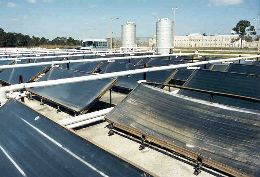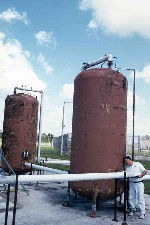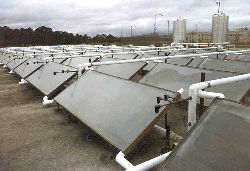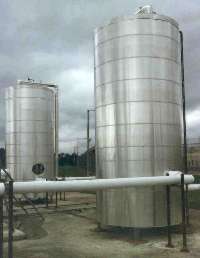
![]()
The Florida Solar Energy Center assisted the Florida Department of Corrections (DOC) in evaluating the status of the solar water heating systems installed at various DOC institutions. These systems had been installed many years ago in conjunction with the construction of the prison facilities. In many cases, these system were installed by contractors who had little experience in the installation of solar systems.
Realizing the potential energy savings that these system could provide, the DOC wanted to make sure that they were being used to their full potential. They contracted with the Florida Solar Energy Center to evaluate some of the systems and determine what needed to be done to achieve optimum performance.
The purpose of the overall project and respective system evaluation was to
- determine the operation status of the various systems
- determine the repairs necessary, if any, to reactivate the systems
- develop system repair specifications and bid documentation
- award and coordinate activities with members of the solar industry to conduct required modifications and repairs
- inspect final repairs of the solar system
This web page provides a detailed description of the activities conducted at a one of these institutions, the Martin Correctional Institute in Martin County.
Martin Correctional Institute Solar Water Heating System
Initial Inspection
The Martin County solar water heating system consists of two large independent solar arrays, one located north and the other south of the security compound. Each solar collector array consists of 75 collectors. The collectors heat water that is stored in two large 2,000 gallon capacity tanks. This solar-heated water is in turn plumbed to an auxiliary water heating tank located in the facility boiler room. Computer modeling of the system projected a savings of approximately $5,000 per year based on anticipated hot water usage.
An inspection of the system was conducted to determine the status of the following components
- solar collectors
- storage tanks
- piping and pipe slope
- controllers and control wiring
- pumps
- ancillary system valves
 Although the initial inspection revealed that several components had deteriorated and the system was not being used, it could be economically repaired. As in any type of large institutional energy system, the system must be maintained by maintenance personnel on a scheduled basis to prevent deterioration of components and to ascertain that it is indeed operational at the time.
Although the initial inspection revealed that several components had deteriorated and the system was not being used, it could be economically repaired. As in any type of large institutional energy system, the system must be maintained by maintenance personnel on a scheduled basis to prevent deterioration of components and to ascertain that it is indeed operational at the time.
Several of the collectors needed to be replaced while others required new absorbers. The two storage tanks were discovered to be in overall satisfactory condition. Several of the tank flanges exhibited environmental corrosion and required repairs. The insulation on some tanks also required replacement.
 The system controllers were found to be inoperable. A continuity test of the control wiring was positive, but the control wiring was brittle and cracking due to environmental degradation. Several of the pumps were locked-up and would have to be replaced. Inspection of ancillary system valves indicated that a large majority of the valves were damaged due to stagnation, rust, wear, and corrosion.
The system controllers were found to be inoperable. A continuity test of the control wiring was positive, but the control wiring was brittle and cracking due to environmental degradation. Several of the pumps were locked-up and would have to be replaced. Inspection of ancillary system valves indicated that a large majority of the valves were damaged due to stagnation, rust, wear, and corrosion.
The problems encountered during the inspection of this large solar system were deemed to be repairable. At this point, specifications listing the required repairs were developed by FSEC and disseminated to members of the Florida solar industry for bids. The wining bid for the modification and repair work was awarded to Solar Energy Systems of Ft. Pierce.
System repairs and activation
 The required repairs and modifications were conducted by Solar Energy Systems of Ft. Pierce. FSEC staff verified that all work was completed and met the requirements of the repair specifications. The system was then deemed to be in operating condition.
The required repairs and modifications were conducted by Solar Energy Systems of Ft. Pierce. FSEC staff verified that all work was completed and met the requirements of the repair specifications. The system was then deemed to be in operating condition.
FSEC staff also developed and provided the facility manager at the institution an Operation & Maintenance Manual for the solar system.

